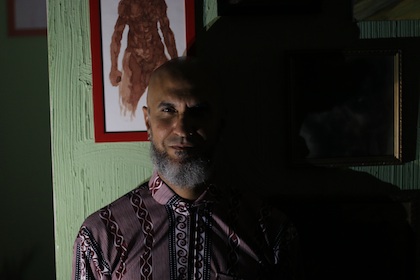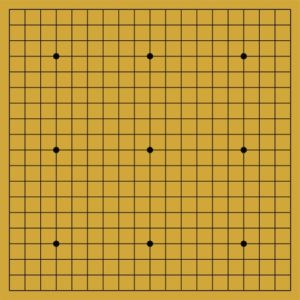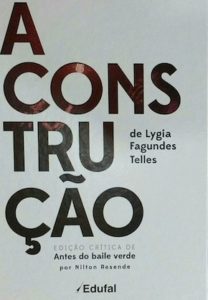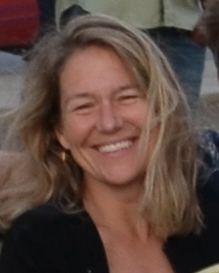Nilton Resende: Good and evil
by Kim M. Hastings
Author portrait © Josué Seixas
A native of Maceió, Alagoas, in Brazil’s northeast, Nilton Resende has made a name for himself in multiple artistic fields. He’s an adjunct professor of literature at the state university; co-founded the Ganymedes theatre company, for which he adapted, co-directed, and starred in Thomas Mann’s Mario and the Magician; and has worked as a film actor, casting director and screenwriter. He is the author of two volumes of poetry (O orvalho e os dias and Ouriço), a short story collection (Diabolô), and a critical edition of Lygia Fagundes Telles’s Antes do baile verde. His work-in-progress, Hóstia, is a performance piece that aims to further relate literature, theatre, and audiovisual and plastic arts.
My first exposure to his work was the short story ‘A ceia’ (translated here as ‘The Supper’), its title conjuring betrayal; its opening, visceral violence. I was riveted as I read it, and reached out to ask Nilton about its genesis. The following is a synopsis of our conversation.
KH: Where did the idea for this story emerge from?
Actually the story was born in a moment when I was eating a cookie. My tongue felt the pattern on it and I remembered a game I used to play with my paternal grandfather. I came up with the first line as I was biting the cookie, and from there I set to writing.
Good and evil are intimately related to will. We’re beings who go through different situations during our lives and have to make choices, make decisions, some easier, some harder.”
I thought about the idea of searching for space, for affirmation. Affirmation through negation. The boy’s father denies his own father in order to give space to his son, as if it were a matter of physics: something has to go so that another can take its place.
There are the sexual issues too. The boy has a hard-on at the start of the story, whereas the old man’s penis is shrivelled.
What about your choice of title?
I think about the title in two ways: in reference to Judas’s betrayal of Christ, right after the Last Supper; and, mainly, in reference to the fact that the boy ‘swallows up’ and feeds on the old man.
 Can you share a bit more about the game the grandfather teaches the boy? It’s a version of an old Chinese board game?
Can you share a bit more about the game the grandfather teaches the boy? It’s a version of an old Chinese board game?
Yes, it’s a variation of Go. But the game between the grandfather and grandson is simpler: a grid is drawn up and beans are placed on the points. When one player manages to ‘capture’ the other’s beans, those are removed from the game or ‘eaten’. The grandfather would play with his grandson on a grid the old man traced on paper or cardboard. In the final game, the boy carves a grid into wood, a sign of his greater strength and superiority.
In his play for power, the boy conceives of all sorts of devious games, toying with his grandfather physically and psychologically. It’s difficult to imagine such cruelty. Can you expand on your thought process in creating this character?
I think the boy’s cruelty to the grandfather is really a repeated search for pleasure – the pleasure that power gives someone who has it, in order to renew the actions that affirm that power, taking delight in the joy each time. Maybe the boy is acting less out of cruelty itself and more for the pleasure that power gives him.
Even if his acts are solely out of cruelty, I think that’s pretty plausible. For me, the human is the realm of the possible. If I can hope for the most sublime acts from human beings, I must also be prepared for the most dreadful. I find it odd when someone says they wouldn’t be ‘capable’ of doing something terrible. Being capable is having the power to do something, having the capacity; that’s different from wanting to do it. I can say that I’m capable of killing someone – but I don’t want to. So good and evil are intimately related to will. I don’t think they’re a matter of character, as if we were pure beings, entirely good or bad, easily classifiable. We’re beings who go through different situations during our lives and have to make choices, make decisions, some easier, some harder.
I’m not usually surprised by people, by their good or evil acts. It’s not that I’m expecting someone’s going to do something evil – it’s simply that I’m not surprised.”
Clearly I’m not including people with disorders, sociopaths; I’m talking about the ordinary people we coexist with daily. People who could one day turn up in the police blotter and we might say: “Oh, I never would have expected that of him.” Let me say, I’m not usually surprised by people, by their good or evil acts. It’s not that I’m expecting someone’s going to do something evil – it’s simply that I’m not surprised.
Maybe that stems from my having gone through a radical religious experience for a while: I wanted to be a saint! I sought sainthood, and spent three years living with an almost medieval Catholic devoutness. My soul-searching was deep – until the time came when I no longer suffered from the evil I did, but from the good I didn’t. After that experience, I came to know that I could be capable of many things. I came to know our capacity as a species and as individuals.
There’s an image I love in Homer’s Odyssey. Athena says something that displeases her father Zeus. He reprimands her, asking her what word she allowed to slip from the “enclosure of [her] teeth.” I think this is one of the finest things I’ve ever read – teeth as this enclosure that keeps the tongue in check, preventing what should remain in from coming out. We see our tendencies, the list of possibilities within us, in a similar way. That’s why I don’t find the perversity of the boy in the story inconceivable. I think he just let out his tendency toward evil.
It’s interesting to know what we’re capable of, as a species and as individuals. Everything is present in literature, including evil. But I don’t like when violence is seemingly used just to shock. I think it loses its value, its power that way. I find it interesting when it appears but we’re able to pick up on the forces at play – when characters have some mystery to them, when they’re not flat. I say that in reference to works I enjoy reading, not as someone who has managed to write anything like that.
There are a lot of topics that distress us, that we try to avoid. There are topics whose very names repulse us, but if we can’t even handle the names of things, how are we going to handle the things themselves? The words are there so that we can approach things. There are many aspects within us that are our own, but we handle them as if they belonged to something distant or utterly foreign. I think we have to approach these without dismay. The more astonished we are by what makes up our nature, the less we’ll be able to handle it.
What was your own boyhood like? Were you drawn to literature and its possibilities from an early age?
My youth basically revolved around literature. I was always very shy, so I took refuge in books. While my sisters were out at bars with friends, I was in my room reading. I’ve liked to read since I was a child. My family always liked to read: comics, books, everywhere. Everyone always took and still takes something to read in the bathroom.
When I had lunch, I’d bring comic books to the table. My grandparents would argue and take the comic from my hands, so I’d be left reading the labels on my grandmother’s medicine or on the condiment bottles. I’d bring food up to my mouth with one hand and turn the boxes or bottles with the other, reading everything. I’m fascinated by words.
Literature came to me as a way to engage with the world. Unable to deal with it directly, I used literature as a bridge.”
But I was always very shy, timid, insecure. My self-esteem was low, abysmal, Mariana Trench depth. I was ashamed to leave the house, go to the beach, go to parties, flirt with anyone, be seen. As a kid I dreamed of becoming a dancer. I love to dance. But one day an aunt’s boyfriend saw me dancing and asked me if I was Ney Matogrosso – Ney Matogrosso is one of our greatest artists, but right then the guy invoked Ney solely to try to assault me with his crude heterosexual male prejudice. From that day on, I reined in my body and my shyness increased. I also dreamed of becoming an actor, but my shyness held me back. Literature came to me as a way to engage with the world. Unable to deal with it directly, I used literature as a bridge. Not having had the courage to dance, having given up and imprisoned my body, and not having invested in becoming an actor, I ended up investing more in literature – it seemed a better fit for someone who didn’t have the courage to take a stance, bear his body in the world. I think it all had to do with denial of the body.
 Literature kept me company throughout my youth. Much of what I know about myself and other people I owe to literature – especially to the work of Lygia Fagundes Telles, my favourite author. Her characters taught me a lot about myself and about human beings. Furthermore, she’s a master at the art of narrative. Aside from being concerned with plot, she takes enormous care with how each story is told. Her complex narrators always make for great analysis.
Literature kept me company throughout my youth. Much of what I know about myself and other people I owe to literature – especially to the work of Lygia Fagundes Telles, my favourite author. Her characters taught me a lot about myself and about human beings. Furthermore, she’s a master at the art of narrative. Aside from being concerned with plot, she takes enormous care with how each story is told. Her complex narrators always make for great analysis.
One of Lygia’s stories, ‘A medalha’ (‘The medal’), saved my relationship with my mother. It’s a terrible tale of a young girl and her mom clashing to the very end. I decided that I didn’t want my relationship with my own mother to suffer the same consequences, so I changed my attitude. She did too. Another of Lygia’s stories, ‘Venha ver o pôr do sol’ (‘Come see the sunset’), is a masterwork of seduction and manipulation of the reader. I’ve been reading it to my students on the first day of class for twenty years. So literature and Lygia have also helped me in my professional life.
Now I’m an actor and a writer. I also adapt literary works for theatre and film, direct plays, and in February I’ll direct my first short film, based on Lygia’s story ‘Natal na barca’ (Christmas on the ferryboat). What I am today, personally and professionally, my understanding of the world and my understanding of others, I owe to literature.
In addition to writing prose, you’re a poet. Do you prefer one genre over the other? Is there overlap in terms of the themes or subjects you explore in each?
I’d say I’m a prose writer who occasionally writes poems; I think my best works are prose. I’ve read more prose than poetry, nourished myself more on prose than poetry, so I have less knowledge of poetry. And an average writer has to be a great reader first; a good writer has to be a reader forever. When I say that I have less knowledge of poetry, I mean that in the empirical sense, in terms of more intimate familiarity. For example, I’m always thinking about narratives, ways of narrating – that always spurs me on when I’m reading prose. The stories themselves have become of less interest to me. This is somewhat the result of my studies of Lygia’s work.
As for themes, my poems usually come into existence to recount something very private, generally desire, a relationship. My first collection, O orvalho e os dias, tried to recount a mystical experience with Kadosh, or God. He’s the Other I speak of and to, although obviously someone can read the poems and put another person in His place. I wrote the book because my love for Him, my experience relating to Him, couldn’t be left unspoken; it needed to be expanded. The first edition, which came out in 1998, was impassioned; in the second, from 2006, my passion had cooled. I revised the book; the poems couldn’t stay the same because I was in crisis. The book, in both versions, is loving and anguished, sacred and profane, respectful and blasphemous. After all, there can be no love without blasphemy. It can’t be reined in or enclosed. Loving God, loving a god, is terrible. And I’m often still afraid of getting close to Him again – at least, I’m afraid of getting close the way I did the first time. Afraid of what love could ask of me. We know that loving someone is not just anything, that a relationship isn’t just anything. And if that someone is a god, it certainly isn’t just anything.
In prose I dress up, cover myself up more. In poetry I disrobe, I’m naked. My themes in prose usually have to do with some intimate or veiled violence – cruelty, fear, things we try to hide from others or from ourselves.”
Ouriço was also born out of a relationship experience. It attempted to recount missing another. A friend of mine (until then, heterosexual) decided he wanted to have a relationship with another man. One night, coming out of a therapy session, he called saying he wanted to hook up with me. I thought he was kidding. After all, he’d always known that I found him interesting. He came over and we were together a few hours, so that he could experience another man’s body, experience being with another man, which he and his therapist thought would be pertinent.
So we hooked up, but he wanted just that moment and I wanted more. Ouriço was born of my no longer having him. We’ve got together again since – but long after the denial, long after the book was written. When I finished writing (and suffering), there was some joy for us both: he’d had the experience he needed, and I now had a book. It’s short, just 10 poems. In them, I write myself with fewer veils. In prose I dress up, cover myself up more. In poetry I disrobe, I’m naked. My themes in prose usually have to do with some intimate or veiled violence – cruelty, fear, things we try to hide from others or from ourselves, things we’re ashamed of. A recurring theme is the loss of innocence, expulsion from paradise, the falling of some veil.
Poetry is an attempt to give an account of myself; prose an attempt to give an account of the world, even if I’m the point of departure – which is interesting because there are many poets who recount the world through poetry. This diversity, our many ways of engaging with art, is beautiful.
 Kim M. Hastings is a freelance translator and editor based in the US. She lived in São Paulo for several years, studied Brazilian language and literature at Brown University, and holds a PhD in Spanish and Portuguese from Yale. Her translations include Edgard Telles Ribeiro’s award-winning novel His Own Man and short fiction published in more than a dozen print and web magazines including Words Without Borders, Review: Literature and Arts of the Americas, Two Lines, Machado de Assis, and stories by Lúcia Bettencourt, Marcelo Moutinho, Alberto Mussa and Ronaldo Wrobel for Bookanista.
Kim M. Hastings is a freelance translator and editor based in the US. She lived in São Paulo for several years, studied Brazilian language and literature at Brown University, and holds a PhD in Spanish and Portuguese from Yale. Her translations include Edgard Telles Ribeiro’s award-winning novel His Own Man and short fiction published in more than a dozen print and web magazines including Words Without Borders, Review: Literature and Arts of the Americas, Two Lines, Machado de Assis, and stories by Lúcia Bettencourt, Marcelo Moutinho, Alberto Mussa and Ronaldo Wrobel for Bookanista.
Read more about Nilton Resende:
trajeslunares.com
@niltonjmresende

